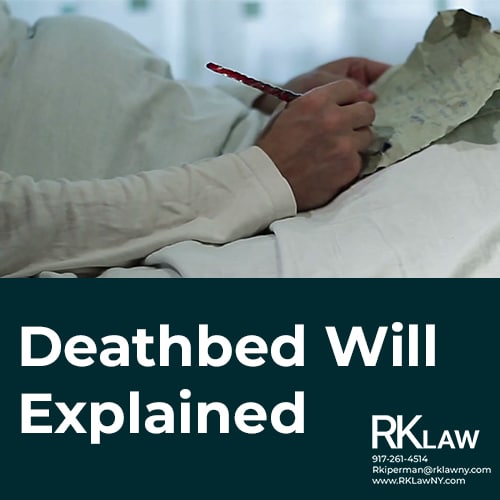A Last Will and Testament is a critical document that outlines how a person’s assets should be distributed after their death. Ideally, a Will is created and updated when a person is in good health and has ample time to consider their wishes. However, there are instances where a Will is made at the last minute, often known as a “deathbed will.”
What Is a Deathbed Will?
A deathbed will is a Will created by someone who is near the end of their life, typically due to illness or impending death. These wills are often made in a hurry, with limited time for contemplation or legal formalities. Although the urgency of the situation can complicate matters, a deathbed will is still legally valid if it meets the necessary requirements.
Legal Requirements for a Valid Will
To be legally valid, a will must generally meet the following criteria:
Testamentary Capacity: The person making the Will (the testator) must be of sound mind and understand the nature of their assets, who their beneficiaries are, and the legal effects of signing the will.
Voluntariness: The Will must be made without undue influence, coercion, or fraud.
Proper Execution: The Will must be in writing, signed by the testator, and witnessed by a specific number of witnesses (the exact requirements vary by jurisdiction. In New York, two witnesses are required).
Challenges with Deathbed Wills
Creating a deathbed Will can present several challenges and lead to Will contests, including:
Lack of Capacity: The testator may be too ill or incapacitated to have testamentary capacity, leading to questions about the will’s validity.
Undue Influence Due to the vulnerability of the testator, there might be concerns about undue influence from family members or caretakers.
Improper Execution: In the rush to create a Will, it may not meet all legal requirements, such as proper witnessing or notarization.
Disputes Among Beneficiaries: Deathbed Wills can sometimes lead to disputes among family members, especially if they contradict prior Wills or expected inheritance patterns.
Best Practices for Deathbed Wills
If you’re involved in creating a deathbed Will, consider these best practices to ensure its validity and reduce the risk of disputes:
Involve Legal Counsel: Work with an attorney specializing in estate planning to ensure the will meets all legal requirements.
Ensure Testamentary Capacity: Obtain medical documentation or a statement from a healthcare professional confirming the testator’s mental capacity at the time of creating the Will.
Minimize Undue Influence Ensure the testator has private conversations with legal counsel and witnesses to confirm the will is being made voluntarily.
Follow Proper Execution Procedures: Adhere to the legal requirements for signing and witnessing the will. This might include having a notary public present if required by law.
Document the Process: Keep detailed records of the circumstances surrounding the creation of the will, including who was present, the testator’s condition, and any discussions about the will’s content.
Deathbed Wills can be valid but are often fraught with challenges and potential disputes. By following best practices and seeking legal counsel, you can help ensure that a deathbed will is properly executed and stands up to scrutiny in Surrogate’s Court or other probate proceedings. If you’re involved in creating or contesting a deathbed will, it’s crucial to understand the legal requirements and take steps to protect the testator’s intentions.
For more information, please contact NYC Probate Litigation, Guardianship, NYC Probate and Estate Planning attorney Regina Kiperman:
Phone: 917-261-4514
Fax: 929-556-2089
Email: rkiperman@rklawny.com
Or visit her at:
40 Wall Street
Suite 2508
New York, NY 10005
Visit Regina on LinkedIn
Visit Regina on Facebook
This page is made available by the lawyer for educational purposes only as well as to give you general information and a general understanding of the law, not to provide specific legal advice. By using this site you understand that there is no attorney client relationship between you and the lawyer. The post should not be used as a substitute for competent legal advice from a licensed professional attorney in your state. ATTORNEY ADVERTISING.
